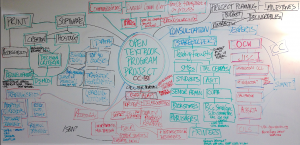As the Open Education director for BCcampus, Mary is responsible for our open education programs including, the Open Textbook program, professional learning and training programs, and applied research projects such as the remote web-based science labs (RWSL /NANSLO).

1. Can you give us an overview of the open textbook project?
The open textbook project works on a cycle of adopt, adapt and create. Our overall objective is to produce 60 high-caliber open textbooks; 40 for the most highly enrolled subject areas for B.C. post secondary institutions, and 20 for areas in which, as a province, we have skills gaps. The provincial government is currently determining the areas for the 20 skills gap related textbooks.
For the first phase, we harvested as many existing open textbooks as we could and asked faculty to help us determine the quality of those texts by writing reviews.
Those reviews and our related outreach led to the second phase of the project: adaptation.
For this second phase, we are funding faculty to make improvements to existing open textbooks so they are better suited to the learning needs of students in B.C.
And, finally for the third phase, we’re funding faculty to create open textbooks from scratch in areas in which none currently exist.
My whiteboard gives a good overview of all the moving pieces and considerations required to not only make this project successful but self-sustaining
2. Why are open education and the open textbook project so important to you?
I believe everyone should have access to education. And, for some the expense is just too much to bear.
By producing free, high quality openly licensed textbooks and other open educational resources, we begin to break down that barrier. There is a moral imperative at work here that relates to the kind of society we value.
For me it’s a more educated society with equal access to learning for all.

3. How are social technologies and open education changing higher education? What will the future look like?
Wow. That’s a big question!
My crystal ball tells me that in future, pedagogy will be different, and that’s actually already happening.
Openly licensed resources combined with social technologies will enable co-creation of learning by both faculty and students. The ability to take control of ones’ own learning, including using social technologies and open resources creates a very different model. Learners become more empowered. We will still need experts to facilitate and contextualize that learning. Learners will be active participants and enabled to help one another.
4. Open Education Week is coming up next month. What will BCcampus be doing to participate?
We’re excited about the upcoming open education week. It’s our chance to shine. We will be featuring good quality resources from our open textbook collection. The resources we’ll be highlighting were all peer reviewed, vetted and received high marks.
As part of open education week, we’ll be sharing our own BCcampus-produced videos around open licensing, and taking part in events hosted by open education resource practitioners in other jurisdictions.
5. For those of us interested in learning more, do you have any must read books or links to explore?
Our website is a great place to start. It’s got tons of information including how to adopt and adapt open textbooks. Dr. David Wiley’s Tedx talk provides a good grounding in open education, including defining openness and why sharing is important.
Notable Quotes
I believe everyone should have access to education. And, for some the expense is just too much to bear. By producing free, high quality openly licensed textbooks and other open educational resources, we begin to break down that barrier. There is a moral imperative at work here that relates to the kind of society we value. ~ Mary Burgess
Openly licensed resources combined with social technologies will enable co-creation of learning by both faculty and students. The ability to take control of ones’ own learning, including using social technologies and open resources creates a very different model. Learners become more empowered. ~ Mary Burgess
